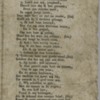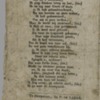KLAGTEN van een Deserteur, over de valsche liefde staande voor den kogel
Title
KLAGTEN van een Deserteur, over de valsche liefde staande voor den kogel
Subtitle
Complaints of a deserter, about the false love, standing in front of the bullet.
Digital Object
Image notice
Full size images of all ballad sheets available at the bottom of this page.
Image / Audio Credit
Amsterdam Meertens: Lbl Meertens 06101. Nederlandse Liederenbank
Set to tune of...
Van den Bamboucheur
Transcription
1. Learn from me, young people,
Hear how my left went,
Because a false girl,
In my young years,
That which my heart and soul sought,
Has brought me into sorrow.
2. I had loved her,
From when we were two children,
And I was minded,
To pair with her,
But fate appointed me a soldier,
Which brought me in this state.
3. Oh! How many a tear,
I saw leak out of her eyes,
When I had to leave,
It appeared that she had collapsed;
I comforted her with good cheer,
Because it hurt me.
4. She spoke: oh lover,
I had settled my heart and mind,
To be a pair,
And to begin marriage.
The sadness, it comes to me,
Your departure is my grave.
5. We readily separated,
With tears in the eyes,
After half a year,
I found myself deceived,
When I wrote the first letter,
I did not receive an answer from my love.
6. Then I heard;
That that false girl was going to marry,
I then called out unsettled:
That it would grieve you,
I went drinking early and late,
I [] to service or state.
7. I have caroused,
And finally to abandon [my comrades],[1]
I have deserted
To exact my vengeance,
But the guard arrested me,
I have injured two or three.
8. I was tightly bound,
And came before the war council,
There my sadness grew,
When I heard,
That the bullet was for me,
There was no mercy.
9. I called: false friend,
Must I leave my life young,
Because of your false love,
Reflect yourselves, soldiers!
That true love avails,
Does not matter[2] to daughters.
10. I stand before death,
Adieu, youth who still live,
In the final sad moment,[3]
My heart full of fear,
I say, adieu, you false girl,
I go to eternity.
Hear how my left went,
Because a false girl,
In my young years,
That which my heart and soul sought,
Has brought me into sorrow.
2. I had loved her,
From when we were two children,
And I was minded,
To pair with her,
But fate appointed me a soldier,
Which brought me in this state.
3. Oh! How many a tear,
I saw leak out of her eyes,
When I had to leave,
It appeared that she had collapsed;
I comforted her with good cheer,
Because it hurt me.
4. She spoke: oh lover,
I had settled my heart and mind,
To be a pair,
And to begin marriage.
The sadness, it comes to me,
Your departure is my grave.
5. We readily separated,
With tears in the eyes,
After half a year,
I found myself deceived,
When I wrote the first letter,
I did not receive an answer from my love.
6. Then I heard;
That that false girl was going to marry,
I then called out unsettled:
That it would grieve you,
I went drinking early and late,
I [] to service or state.
7. I have caroused,
And finally to abandon [my comrades],[1]
I have deserted
To exact my vengeance,
But the guard arrested me,
I have injured two or three.
8. I was tightly bound,
And came before the war council,
There my sadness grew,
When I heard,
That the bullet was for me,
There was no mercy.
9. I called: false friend,
Must I leave my life young,
Because of your false love,
Reflect yourselves, soldiers!
That true love avails,
Does not matter[2] to daughters.
10. I stand before death,
Adieu, youth who still live,
In the final sad moment,[3]
My heart full of fear,
I say, adieu, you false girl,
I go to eternity.
[1] ‘steek’ here refers to the saying ‘in de steek laten’ i.e. ‘leave behind’ or ‘abandon.’ This saying has a specific military connotation where it means ‘to abandon in battle’ as well as ‘abandoning one’s comrades and/or leaders.’
[2] ‘staat’ refers to state, status, or condition. The implied meaning here is that true love is not an important ‘state’ for women, i.e. it does not matter.
[3] ‘nood’ refers to the speaker’s anguish (both physically and mentally) which he experiences right before his death. In Dutch the word also encompasses a sense of emergency, pressure, sad conditions, and violence or force done against him.
Date
Collection
Citation
“KLAGTEN van een Deserteur, over de valsche liefde staande voor den kogel,” Execution Ballads, accessed February 27, 2026, https://omeka.cloud.unimelb.edu.au/execution-ballads/items/show/1264.


